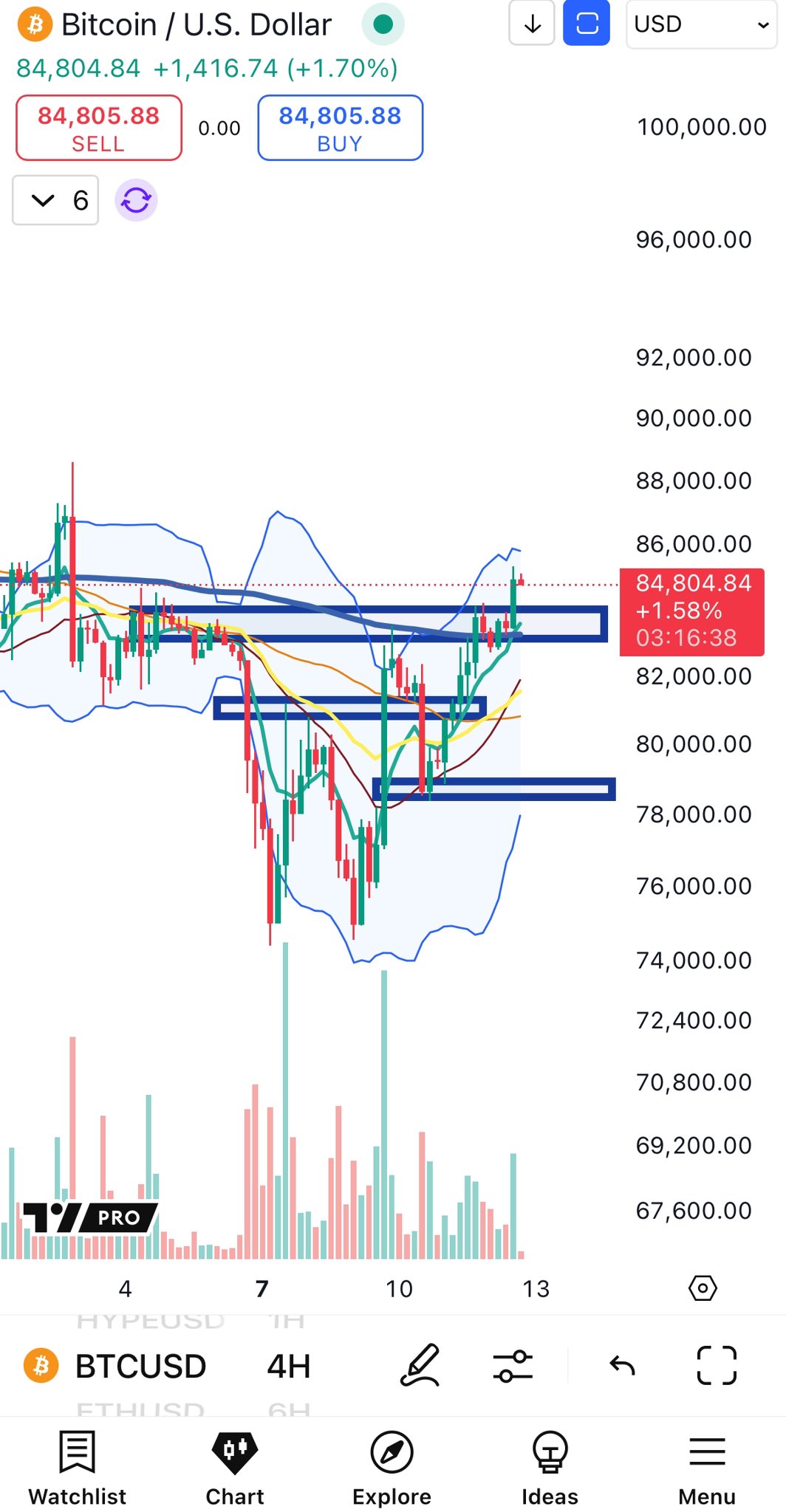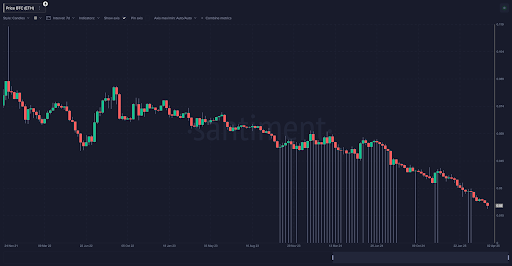Bitcoin
Is $200,000 a Realistic Bitcoin Price Target for This Cycle?
Published
3 months agoon
By
admin

Bitcoin has been making waves in the financial world, with many speculating about its potential to reach new heights. As we explore whether the Bitcoin price can realistically hit $200,000 this cycle, we’ll dive into the market dynamics and what drives prices higher.
For an in-depth complete analysis, refer to the original Can Bitcoin Realistically Reach $200,000? full video presentation available on Bitcoin Magazine Pro’s YouTube channel.
Key Takeaways
- Bitcoin’s price is influenced by supply and demand dynamics.
- Long-term holders play a significant role in market stability.
- The money multiplier effect shows how market cap can increase with new investments.
- Current trends suggest a cautious outlook for reaching $200,000.
Understanding Supply And Demand
At its core, Bitcoin’s price is driven by supply and demand. If the supply decreases or remains stable while demand increases, we can expect the price to rise. To gauge this, we look at how much new Bitcoin is being accumulated by new market participants and how much is being distributed by long-term holders.
Related: We’re Repeating The 2017 Bitcoin Bull Cycle
The Role Of Long-Term Holders
Long-term holders are defined as those who have held Bitcoin for 155 days or more. This group tends to influence the market significantly. Recently, the long-term holder supply peaked at around 16.14 million BTC. However, as of now, that number has dropped to about 14.5 million BTC. This shift indicates that a substantial amount of Bitcoin has been moved, which can impact market dynamics.
Short-Term Holders And Market Influence
Short-term holders, including institutional buyers and corporations, are actively accumulating Bitcoin. Their actions can influence the market cap and price of Bitcoin. The money multiplier effect is a concept that helps us understand how much impact a dollar inflow can have on Bitcoin’s market cap. For instance, if we consider that $1 invested in Bitcoin can increase the market cap by about $2.5 to $6.73, it shows the potential for significant price movements based on new investments.
Calculating The Money Multiplier Effect
To get a clearer picture, we can analyze the relationship between the long-term and short-term holder supplies and the market cap. By averaging data over a 90-day period, we can see that the current money multiplier effect is around 6.73. This means that for every $1 invested, the market cap increases by about $6.73.
What Would It Take To Reach $200,000?
To explore the possibility of Bitcoin reaching $200,000, we need to consider the market cap. Currently, Bitcoin’s market cap is above $2 trillion. To hit $200,000, it would need to reach about $4 trillion. The difference of $2 trillion would require a significant amount of Bitcoin to change hands.
If we assume an average accumulation price of $150,000, we would need about 1.9 million BTC to be transferred from long-term to short-term holders. This would reduce the long-term holder supply to about 12.6 million BTC. Given the current trends, this scenario seems a bit of a stretch, as we’ve seen a decline in the amount of Bitcoin being transferred in recent cycles.
Historical Trends And Future Predictions
Historically, we’ve seen a diminishing trend in the amount of Bitcoin transferred from long-term to short-term holders. If we look at previous cycles, the maximum amount transferred has decreased over time. This suggests that reaching 12.6 million BTC in long-term holder supply may not be realistic for this cycle.
However, if we adjust our expectations to around $150,000, it appears more attainable, requiring a long-term holder supply of about 13.3 million BTC. This aligns better with historical trends.
Related: What Bitcoin Price History Predicts for February 2025
Conclusion: Is $200,000 Possible?
In summary, while reaching $200,000 for Bitcoin is not out of the question, it requires a significant shift in the market dynamics. The current money multiplier effect and the trends in long-term holder supply suggest that while it’s possible, it may be more realistic to focus on the $150,000 to $250,000 range. The market is constantly evolving, and with institutional interest growing, we might see unexpected movements in the future.
As always, it’s essential to stay informed and consider all factors when making investment decisions.
If you’re interested in more in-depth analysis and real-time data, consider checking out Bitcoin Magazine Pro for valuable insights into the Bitcoin market.
Disclaimer: This article is for informational purposes only and should not be considered financial advice. Always do your own research before making any investment decisions.
Source link
You may like


This Week in Crypto Games: Gaming Tokens Crash Out, Eve Frontier Opens Up


Commerce Secretary Lutnick walks back tariff relief on electronics


Gold ETF Inflows Hit Three-Year High as PAXG, XAUT Outperform Wider Crypto Market


Israel’s New Study Shows 51% Of Public Is Interested In Adopting CBDC (Digital Shekel) – Is That So?


Solana Price Eyes Breakout Toward $143 As Inverse Head & Shoulders Pattern Takes Shape On 4-hour Chart


Crypto malware silently steals ETH, XRP, SOL from wallets
24/7 Cryptocurrency News
Michael Saylor Hints At Another MicroStrategy Bitcoin Purchase, BTC Price To Rally?
Published
7 hours agoon
April 13, 2025By
admin
MicroStrategy is lacing up for a potential Bitcoin purchase after Michael Saylor flashed the tell-tale buy signal. The incoming purchase will be the company’s first in Q2 after pausing Bitcoin purchases at the start of April in an eyebrow-raising move.
Michael Saylor Flashes Bitcoin Buy Signal
MicroStrategy CEO Michael Saylor has dropped clues that the software company will continue its Bitcoin accumulation spree. In an X post, Saylor shared MicroStrategy’s portfolio tracker revealing the company’s Bitcoin holdings and valuations.
Michael Saylor’s previous posts sharing Microstrategy’s portfolio tracker over the weekend have resulted in purchases at the start of the week. Investors are lapping up Saylor’s portfolio tracker post and the accompanying caption as cues for a BTC purchase on Monday.
“No tariffs on Orange Dots,” said Saylor, taking a jibe at brewing tariff wars between the US and China.
MicroStrategy had previously halted its Bitcoin purchase spree at the start of April leading to a slump in MSTR price. At the time, there was significant chatter that MicroStrategy may be forced to offload its Bitcoin holdings to cover obligations following a dip in prices.
Per the portfolio tracker, MicroStrategy holds 528,185 BTC on its balance sheet valued at $44.7 billion. Michael Saylor hinting at a potential Bitcoin purchase follows a small dip in prices with BTC holding the $83K mark.
Will Bitcoin Price Rally?
Saylor’s hint at buying Bitcoin has triggered a small bump in prices as the top cryptocurrency surpassed $83K. However, an actual purchase will trigger a significant price action for BTC in line with previous accumulations.
MicroStrategy’s last Bitcoin purchase of 22,048 BTC jolted the markets in line with investors’ expectations. However, there are fears that macroeconomic events like the US-China tariff war may affect a potential BTC rally following MicroStrategy’s incoming purchase.
Bitcoin price has rebounded after a previous bloodbath, sparking fresh optimism in the markets. Crypto Joao Wedson predicts that Bitcoin is not out of the woods yet and a grim drop to $65K is still a possibility for the top cryptocurrency.
“We’re not ruling out the possibility of the price dipping below $65K, as several metrics point to that region as strong support – such as the True Market Mean Price and Alpha Price, both sitting exactly around $64,700,” said Wedson.
Crypto analyst Doctor Profit warns that a BTC price drop to these levels may force MicroStrategy to sell MSTR to avoid liquidation.
Aliyu Pokima
Aliyu Pokima is a seasoned cryptocurrency and emerging technologies journalist with a knack for covering needle-moving stories in the space. Aliyu delivers breaking news stories, regulatory updates, and insightful analysis with depth and precision. When he’s not poring over charts or following leads, Aliyu enjoys playing the bass guitar, lifting weights and running marathons.
Disclaimer: The presented content may include the personal opinion of the author and is subject to market condition. Do your market research before investing in cryptocurrencies. The author or the publication does not hold any responsibility for your personal financial loss.
Source link
Bitcoin
Crypto Analyst Says Bitcoin Back in Business, Calls for BTC Uptrend if One Support Level Holds
Published
15 hours agoon
April 13, 2025By
admin
A crypto strategist who accurately called Bitcoin’s collapse below $80,000 believes that BTC’s long-term uptrend will remain intact if it stays above a key price area.
In a new strategy session, pseudonymous analyst Cheds tells his 49,800 YouTube subscribers that Bitcoin appears to have broken out of a W pattern on the four-hour chart.
A W pattern is typically seen as a bullish reversal structure, as it suggests that an asset has printed a price floor after bouncing from a key support level twice.
“We had a break of the W and then a throwback, a throwback being a bullish retest from above. This looks pretty conducive, and this type of price action tells me, ‘Okay, we might be front running $72,000.’
Giving me a little bit of a confidence was a shift in equities markets, and the idea that price was at the MA (moving average) 50, and that’s been support.”
Cheds also says that Bitcoin will likely see higher prices as long as its immediate support level between $78,500 and $81,000 holds.
“Regain $81,000 and we’re back in business… Back above $81,000, we’re back with the idea of regaining that low time frame pivot corresponding with the high time frame support at the MA50, and with the idea that the bulls are going to recapture the trend, which is the rising MA200.”

At time of writing, Bitcoin is trading at $85,301.
Follow us on X, Facebook and Telegram
Don’t Miss a Beat – Subscribe to get email alerts delivered directly to your inbox
Check Price Action
Surf The Daily Hodl Mix
 

Disclaimer: Opinions expressed at The Daily Hodl are not investment advice. Investors should do their due diligence before making any high-risk investments in Bitcoin, cryptocurrency or digital assets. Please be advised that your transfers and trades are at your own risk, and any losses you may incur are your responsibility. The Daily Hodl does not recommend the buying or selling of any cryptocurrencies or digital assets, nor is The Daily Hodl an investment advisor. Please note that The Daily Hodl participates in affiliate marketing.
Generated Image: Midjourney
Source link
Altcoins
Ethereum Price Suffers 77% Crash Against Bitcoin, On-Chain Deep Dive Reveals Reasons Why
Published
21 hours agoon
April 13, 2025By
adminReason to trust

Strict editorial policy that focuses on accuracy, relevance, and impartiality
Created by industry experts and meticulously reviewed
The highest standards in reporting and publishing
Strict editorial policy that focuses on accuracy, relevance, and impartiality
Morbi pretium leo et nisl aliquam mollis. Quisque arcu lorem, ultricies quis pellentesque nec, ullamcorper eu odio.
Despite rolling out a large number of upgrades and innovations, the Ethereum price continues to lag behind Bitcoin (BTC) by a wide margin. Reports reveal that ETH has suffered a staggering 77% price crash against BTC — a decline likely fueled by a mix of technical, macro, and sentiment-driven factors. Notably, On-chain analytics platform, Santiment has now pinpointed and broken down the key reasons behind these price struggles.
Ethereum Price Nosedives Against Bitcoin
On April 11, Santiment released a detailed report on Ethereum, highlighting its almost four-year underperformance and the reasons behind it. Ethereum, once revered as the cryptocurrency most likely to dethrone Bitcoin, has recently suffered a brutal price decline when measured directly against BTC.
Related Reading
According to Santiment’s on-chain data, Ethereum has crashed by approximately 77% against Bitcoin since December 2021. While the dollar value of ETH hasn’t completely collapsed, especially compared to other altcoins, the long-term BTC/ETH ratio still paints a gruesome picture for Ethereum holders.

Notably, Ethereum has also failed to recover anywhere near its November 2021 all-time high of $4,760. In contrast, Bitcoin has surged ahead, reclaiming much of its market dominance and outpacing ETH across almost every timeframe.
This disparity has led many traders and former maximalists to compare ETH to a “shitcoin.” Even worse, various mid to low-cap altcoins have already outperformed Ethereum over the short, mid, and long-term timeframes, causing further embarrassment for the world’s second-largest cryptocurrency by market capitalization. Based on Santiment’s report, the ETH/BTC price ratio chart alone is enough to trigger doubt and uncertainty among long-term holders.
Behind The Scenes Of Ethereum Price Struggles
Beyond price action and market volatility, Santiment reveals that there are fundamental reasons for Ethereum’s sluggish performance over the years. Some of the major criticisms that analysts and traders have pinpointed include technical, sentimental, and regulatory issues.
Related Reading
Ironically, Ethereum’s Layer 2 solutions are one of the key drivers of its underperformance. L2 solutions like Arbitrum, Optimism, and zkSync are reportedly cannibalizing activity on the mainnet, taking investments from ETH while spreading investor attention thin.
Secondly, Ethereum seems to struggle with complex roadmaps and communication, which has led to investor confusion. Major updates like The Merge and Shanghai have been difficult for investors to comprehend, making ETH feel less accessible than BTC.
Thirdly, users remain frustrated by Ethereum’s relatively high gas fees and the slow rollout of key upgrades. This has pushed them toward more affordable and faster alternatives, significantly reducing adoption.
Another primary reason for Ethereum’s crash against Bitcoin is ongoing regulatory concerns. Unlike Bitcoin, which has a more established legal precedent, Ethereum faces constant uncertainty about whether it could be labeled a security.
Other points include ETH’s lack of investment appeal. While Bitcoin maintains the title as a stable digital gold, Ethereum appears to be caught in between, having no clear or attractive investment narrative. Moreover, newer blockchains like Solana and Cardano are also attracting a significant number of users with cheaper and faster solutions, ultimately pulling investments away from ETH.
The final reason Santiment has identified for Ethereum’s long-term price descent is rising selling pressure. Post-upgrade withdrawals of stakes ETHs have created steady sell-side pressure, limiting growth and momentum compared to Bitcoin.
Featured image from Unsplash, chart from Tradingview.com
Source link

This Week in Crypto Games: Gaming Tokens Crash Out, Eve Frontier Opens Up

Commerce Secretary Lutnick walks back tariff relief on electronics

Gold ETF Inflows Hit Three-Year High as PAXG, XAUT Outperform Wider Crypto Market

Israel’s New Study Shows 51% Of Public Is Interested In Adopting CBDC (Digital Shekel) – Is That So?

Solana Price Eyes Breakout Toward $143 As Inverse Head & Shoulders Pattern Takes Shape On 4-hour Chart

Crypto malware silently steals ETH, XRP, SOL from wallets

Binance Executives Met With US Government Officials To Discuss Easing of Regulatory Supervision: Report

Michael Saylor Hints At Another MicroStrategy Bitcoin Purchase, BTC Price To Rally?

From the Crypto Trenches to the Hill: Why Solana Is Making a Big Push in Washington

Bitcoin price tags $86K as Trump tariff relief boosts breakout odds

Where Top VCs Think Crypto x AI Is Headed Next

India’s Leading Bitcoin And Crypto Exchange Unocoin Integrates Lightning

Solana Triggers Long Thesis After Pushing Above $125 – Start Of A Bigger Rally?

Popcat price surges as exchange reserves fall, profit leaders hold

Crypto Analyst Says Bitcoin Back in Business, Calls for BTC Uptrend if One Support Level Holds

Arthur Hayes, Murad’s Prediction For Meme Coins, AI & DeFi Coins For 2025

Expert Sees Bitcoin Dipping To $50K While Bullish Signs Persist

Aptos Leverages Chainlink To Enhance Scalability and Data Access

Bitcoin Could Rally to $80,000 on the Eve of US Elections

Crypto’s Big Trump Gamble Is Risky

Sonic Now ‘Golden Standard’ of Layer-2s After Scaling Transactions to 16,000+ per Second, Says Andre Cronje

Institutional Investors Go All In on Crypto as 57% Plan to Boost Allocations as Bull Run Heats Up, Sygnum Survey Reveals

Ripple-SEC Case Ends, But These 3 Rivals Could Jump 500x

Has The Bitcoin Price Already Peaked?

A16z-backed Espresso announces mainnet launch of core product

The Future of Bitcoin: Scaling, Institutional Adoption, and Strategic Reserves with Rich Rines

3 Voting Polls Show Why Ripple’s XRP Price Could Hit $10 Soon

Xmas Altcoin Rally Insights by BNM Agent I

Blockchain groups challenge new broker reporting rule

I’m Grateful for Trump’s Embrace of Bitcoin
Trending

 24/7 Cryptocurrency News5 months ago
24/7 Cryptocurrency News5 months agoArthur Hayes, Murad’s Prediction For Meme Coins, AI & DeFi Coins For 2025

 Bitcoin3 months ago
Bitcoin3 months agoExpert Sees Bitcoin Dipping To $50K While Bullish Signs Persist

 24/7 Cryptocurrency News3 months ago
24/7 Cryptocurrency News3 months agoAptos Leverages Chainlink To Enhance Scalability and Data Access

 Bitcoin5 months ago
Bitcoin5 months agoBitcoin Could Rally to $80,000 on the Eve of US Elections

 Opinion5 months ago
Opinion5 months agoCrypto’s Big Trump Gamble Is Risky

 Altcoins2 months ago
Altcoins2 months agoSonic Now ‘Golden Standard’ of Layer-2s After Scaling Transactions to 16,000+ per Second, Says Andre Cronje

 Bitcoin5 months ago
Bitcoin5 months agoInstitutional Investors Go All In on Crypto as 57% Plan to Boost Allocations as Bull Run Heats Up, Sygnum Survey Reveals

 Price analysis5 months ago
Price analysis5 months agoRipple-SEC Case Ends, But These 3 Rivals Could Jump 500x



✓ Share: